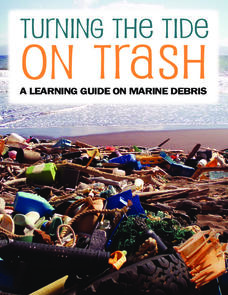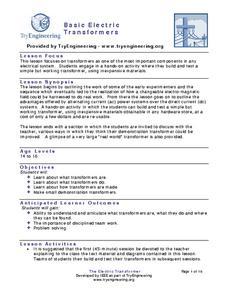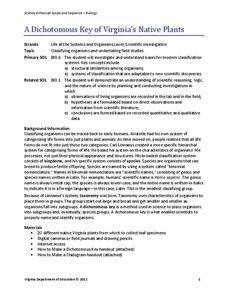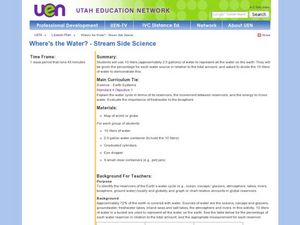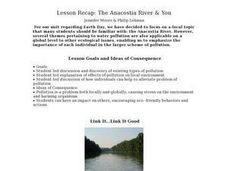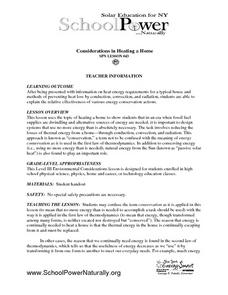Code.org
Creating Functions with Parameters
The pupils practice modifying parameters in a function to add variations to their under the sea scene. The resource also introduces random number functions that alter the scene every time the program runs.
NOAA
Turning the Tide on Trash: A Learning Guide on Marine Debris
The lessons in this learning guide are designed to increase youngsters' awareness of the impacts of marine debris and to teach them about pollution prevention techniques. This fabulous, 30-page packet is chock full of important...
Science Matters
Forms of Energy
The amount of energy Americans use doubles every 20 years. The first lesson in a 10-part series teaches scholars about different forms of energy. They rotate through five stations with hands-on activities or experiments at each in order...
Institute of Electrical and Electronics Engineers
Basic Electric Transformers
Life as we know it would not be possible without electric transformers, so there are fewer more pertinent topics for your eager young engineers. An astounding amount of background information is provided to help you develop a lecture on...
Virginia Department of Education
Weather Patterns and Seasonal Changes
Get your class outside to observe their surroundings with a lesson highlighting weather patterns and seasonal changes. First, learners take a weather walk to survey how the weather affects animals, people, plants, and trees during...
NOAA
Technology I
Isn't technology great? The 12th installment of a 23-part NOAA Enrichment in Marine sciences and Oceanography (NEMO) program introduces technology that marine scientists use. Pupils take part in an activity using conductivity,...
Curated OER
Survival in Antarctica
Explore the harsh climate of Antarctica and its wildlife. Participate in experiments to determine how humans survive in the continent's climate, and address the difficulties faced by scientists.
EduGAINs
Go H2O! Investigating Residential Water Systems
Before your learners excuse themselves to get a drink at the water fountain, prompt them to think about where that water comes from. A middle school science lesson encourages groups to research their community's source of drinking water,...
Curated OER
Apples: Family and Consumer Science
Learning to cook and making good food choices are extremely important life skills. Seventh graders explore food science in relation to health and nutrition, by conducting several experiments on apples. Websites, movies, and instructional...
Curated OER
DNA: Expressions in Agriculture
What is DNA extraction, and can you make a living doing it? Yes, if you are in a biotechnology field. Kids learn about DNA extraction, GMOs, and biotechnology careers. They then watch videos and complete activities to understand the use...
Curated OER
Living and Non-Living Things in the Environment
Third graders examine living and non-living things and observe a plant growing in the classroom. There are many additional resources to assist learning and extension work, they can read books, interact with PowerPoint...
Virginia Department of Education
A Dichotomous Key of Virginia’s Native Plants
Can your class correctly classify plant species? Individuals explore native plants of the local environment and correctly classify them into their respective categories. They investigate differences in the plants and discuss similarities...
University Interscholastic League
English Lesson to Prepare for UIL Spelling and Vocabulary Contest
"i before e. . ." Spelling is easier if kids know the eight basic spelling rules contained in this resource packet.
NOAA
Vertebrates II
Mammals of the ocean unite! Or not. The 20th installment of a 23-part NOAA Enrichment in Marine sciences and Oceanography (NEMO) program investigates how warm-blooded marine mammals survive in water. In the class activity, learners use...
Curated OER
Science Vocabulary game
Play a memory game with science vocabulary words to prepare for an upcoming test! Build both understanding and retention of new vocabulary words by setting up a matching game for your learners to play in small groups of three to...
Curated OER
Where's the Water? Stream Side Science
After a whole-class discussion of water reservoirs, ten liters of water are given to each lab group to represent Earth's total amount of water. They divide the water into smaller containers, each representing one of those reservoirs. The...
Laboratory for Atmospheric and Space Physics
Growing Up With A Mission
New Horizons began its journey to Pluto in 2006. Ten years later, it continues its mission. In that time, scholars have surely grown, but how much more will they grow by the time New Horizons reaches its destination? Find out with an...
National Institute of Open Schooling
Electrochemistry
In an electrolytic cell, electrical energy is converted into chemical energy, the exact opposite of a battery! Lesson 15 in a series of 36 explores electrochemistry. Participants begin by reading and discussing oxidation/reduction...
Curated OER
That's Predictable - Stream Side Science
Research the impact that changes in biotic or abiotic factors might have on an ecosystem. Debate for or against the changes and take action in the community. This resource ideally follows stream studies that young ecologists may have...
NASA
Moon Phases and Eclipses
Starry-eyed astronomers draw different views of the Moon in order to introduce its phases. Then they experiment with a ball and a lamp to recreate the phases. A demonstration ensures every pupil understands the process, and the...
Messenger Education
Exploring Solar Systems Across the Universe
Scientists have theorized that our solar system formed 4.6 billion years ago. In this pair of activities, learners first hypothesize how our solar system was formed. Using this information, groups then determine how scientists search for...
Curated OER
Using MY NASA DATA to Determine Volcanic Activity
Students explore how aerosols are used in science to indicate volcanic activity and how biomass burning affects global aerosol activity. Students access data and import into MS Excel using graphical data to make inferences and draw...
Curated OER
Lesson Recap: The Anacostia River & You - Biology Teaching Thesis
Seventh graders give examples of local sources of pollution and postulate reasons as to why local sources of pollution can harm the ecosystem. They address the following question in short answer form: "Why is litter/chemical pollution...
Curated OER
Considerations in Heating a Home
Emerging engineers discover how important it is to conserve energy as fossil fuel supplies are being diminished. This is accomplished by working through a handout that explains energy requirements for heating a home during the winter....

